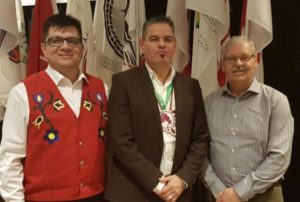OPSEU and Ontario First Nations Chiefs partner on Indigenous Mobilizing Team

TORONTO–On Tuesday, November 22, 2016, OPSEU President Warren (Smokey) Thomas addressed First Nations Leaders from across Ontario who are meeting with Premier Kathleen Wynne and Ontario cabinet ministers this week at the “Leaders in the Legislature” event to discuss collaborative actions on First Nations priority issues such as community safety, education, community wellness, infrastructure and environment.
During his presentation, President Thomas introduced the OPSEU Indigenous Mobilizing Team, the latest OPSEU initiative to partner with First Nations communities. This initiative aims to build an effective and respectful partnership that will implement the 94 recommendations contained in the Truth and Reconciliation Report Call to Action and will hold accountable the government and the people of Canada.
“Our union can play a part in the truth and reconciliation process by adopting these recommendations within our negotiated contract agreements,” said Thomas. “Take for example the first recommendation, child care: let’s demand that all social workers and agencies be trained in accurate true Indigenous history.”
This latest initiative, the Indigenous Mobilizing Team, is an outgrowth of the first biennial OPSEU Indigenous Conference held in Cornwall, Ontario September 30-October 2, 2016. The conference was a true partnership between the OPSEU Indigenous Circle and the Mohawk Nation of Akwesasne. It joins other OPSEU Truth and Reconciliation initiatives that include:
- a campaign to make June 21 a statutory holiday in the province of Ontario and then throughout all of Canada;
- two courses entitled “Indigenous Journey: Walking Together” to educate members on the history of colonialism and its impact on Indigenous communities and offer a way forward towards healing and reconciliation;
- a partnership with Food Share Toronto to work with northern Indigenous communities to establish their own food markets to provide healthy and affordable food to remote communities; and
- participation in the 2017 World Indigenous Peoples Conference and a commitment to international Indigenous Solidarity.
Krista Maracle, Chair of the OPSEU Indigenous Circle, reminds us that “Indigenous communities already know what an effective strategy of healing and reconciliation would look like. They just need partners to help make it a reality. These initiatives are about OPSEU stepping up to be such a partner.’’
The Indigenous Mobilizing Team is composed of three OPSEU Indigenous members who have as their mandate to engage with Ontario First Nation communities and Bands, agencies, and governing bodies in ways that best represents the full interests of Indigenous OPSEU members.
“This is one step in a long journey to honour those that passed and those that have not been born. It is time. We don’t have to wait for governments to start; reconciliation can and should start with all of us,” adds Darlene Kaboni, member of the Indigenous Mobilizing Team. Kaboni is from Wikwemikong Unceded First Nation.


